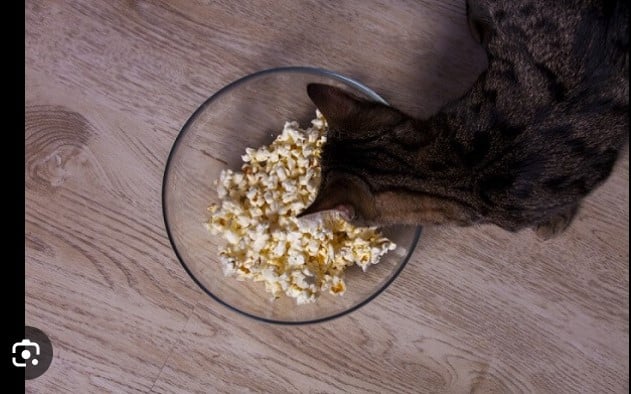As feline enthusiasts, it’s natural to ponder over what foods are safe and suitable for our beloved cats. One such curiosity that often arises is whether cats can partake in the crunchy delight of popcorn. In this comprehensive article, we delve into the question: Can cats eat popcorn? We’ll unravel the nutritional value of popcorn for felines, examine risks associated with feeding popcorn to cats. As well as provide guidelines for offering popcorn to cats and healthy alternatives to popcorn for cats.
Popcorn, a staple snack enjoyed by many, particularly during movie nights or casual gatherings, is made from dried corn kernels heated until they burst open into fluffy, edible bites. While humans find popcorn a delightful treat, it’s essential to scrutinize its compatibility with a cat’s dietary needs.
See also: Are Pothos Toxic to Cats?
Nutritional Value of Popcorn
Popcorn primarily comprises carbohydrates, with minimal amounts of protein and fat. However, this nutritional profile doesn’t align with the dietary requirements of cats. As obligate carnivores, cats thrive on diets rich in animal-based proteins and fats, with minimal carbohydrates. Consequently, popcorn may not offer the essential nutrients cats need for optimal health and vitality.
Moreover, popcorn often comes with additives like salt, butter, or seasonings, which can be detrimental to feline health. Excessive salt intake may lead to electrolyte imbalances and dehydration, while butter’s high-fat content could contribute to digestive issues and obesity in cats. Certain seasonings, such as garlic or onion powder, pose toxicity risks to cats and should be strictly avoided.

Risks Associated with Feeding Popcorn to Cats
When it comes to the risks associated with feeding popcorn to cats, it’s crucial to delve deeper into the potential consequences that may arise. While popcorn may seem harmless, particularly to humans, its impact on a cat’s delicate digestive system can be significant.
See also: Can Cats Eat Cherries?
Choking Hazards
One of the primary concerns when it comes to feeding popcorn to cats is the risk of choking. Popcorn kernels are small, hard, and irregularly shaped, making them prone to becoming lodged in a cat’s throat. Cats, with their instinctual tendency to swallow food without much chewing, may inadvertently swallow whole kernels or large pieces of popcorn, leading to choking. This risk is especially heightened for cats with smaller mouths or dental issues that may struggle to effectively break down the kernels before swallowing. Keep reading, “Can Cats Eat Popcorn?” for more!
Gastrointestinal Obstruction
In addition to choking hazards, the ingestion of popcorn can also result in gastrointestinal obstruction in cats. The indigestible hulls of popcorn kernels can be particularly problematic, as they may not break down easily during the digestive process. These sharp, fibrous hulls can accumulate in the stomach or intestines, forming a blockage that prevents the normal passage of food and waste. As a result, cats may experience symptoms such as abdominal pain, lethargy, loss of appetite, and constipation. In severe cases, gastrointestinal obstruction can lead to life-threatening complications that require surgical intervention to resolve.
See also: Is Lemongrass Safe for Cats?
Digestive Discomfort
Even if a cat manages to consume popcorn without choking or experiencing gastrointestinal obstruction, the indigestible nature of popcorn can still cause significant digestive discomfort. Cats may struggle to break down the tough hulls of popcorn kernels, leading to irritation and inflammation of the digestive tract. This irritation can manifest in symptoms such as nausea, vomiting, diarrhea, and abdominal cramping. Moreover, the high carbohydrate content of popcorn can disrupt the delicate balance of bacteria in the cat’s gut, potentially exacerbating digestive issues and compromising overall gut health.

Toxicity Risks
Furthermore, the risks associated with feeding popcorn to cats extend beyond mechanical issues like choking and gastrointestinal obstruction. Certain additives commonly found in popcorn, such as salt, butter, or seasonings, can be toxic to cats if ingested in sufficient quantities. Excessive salt intake, for example, can lead to electrolyte imbalances and dehydration, while the fats and oils in butter can contribute to obesity and pancreatitis in cats. Moreover, certain seasonings like garlic or onion powder are known to be toxic to cats and can cause serious health complications, including damage to red blood cells and organ failure.
Popcorn may seem like a harmless and enjoyable snack for humans. However, it poses significant risks to the health and well-being of cats. From choking hazards and gastrointestinal obstruction to digestive discomfort and potential toxicity. The consumption of popcorn can have serious consequences for our feline companions. As responsible pet owners, we must prioritize our cats’ safety. Avoid sharing human foods like popcorn. Provide them with a balanced diet. Ensure it meets their specific nutritional needs.
See also: Can Cats Eat Coconut?
Guidelines for Offering Popcorn to Cats
While popcorn should generally be avoided in a cat’s diet, occasional indulgence may be permissible with caution. If you choose to offer popcorn to your feline friend, ensure it is plain, air-popped popcorn devoid of any additives. Remove un-popped kernels and sharp pieces to minimize choking risks. Find out in this post, “Can Cats Eat Popcorn?”.
Choosing the Right Type of Popcorn
When considering offering popcorn to your feline companion, it’s crucial to opt for the safest option available. Plain, air-popped popcorn without any added flavorings, salt, butter, or seasonings is the most suitable choice for cats. These additives can introduce unnecessary risks to your cat’s health, including digestive upset and potential toxicity. By selecting plain popcorn, you ensure that your cat receives a snack free from potentially harmful ingredients.
Thorough Preparation
Before offering popcorn to your cat, take the time to inspect and prepare it thoroughly. Remove any un-popped kernels or sharp pieces that could pose choking hazards or cause injury to your cat’s mouth or throat. Carefully sift through the popcorn to eliminate any potential sources of harm, ensuring that each piece is safe for consumption. This extra step in preparation minimizes the risk of accidents and enhances the safety of the snack for your feline friend.
See also: Can Cats Eat Mango?

Portion Control
While occasional indulgence in popcorn may be permissible, it’s essential to exercise moderation and control the portion size. Limit popcorn servings to small, infrequent portions to prevent overconsumption and mitigate potential health risks. Offering popcorn as an occasional treat maintains balance, meeting your cat’s nutritional needs through their primary diet. Remember, moderation is key when it comes to treating your cat to popcorn. Keep reading, “Can Cats Eat Popcorn?” for ,ore!
Observation and Monitoring
After offering popcorn to your cat, closely observe their behavior and monitor for any signs of adverse reactions. Watch for indications of digestive upset, such as vomiting, diarrhea, or changes in appetite or behavior. If your cat exhibits any concerning symptoms after consuming popcorn, refrain from offering it in the future and seek guidance from your veterinarian. Prompt intervention and professional advice can help address any potential issues and safeguard your cat’s well-being.
See also: Can Cats Eat Raspberries?
Consulting Your Veterinarian
If your cat shows signs of digestive upset post-popcorn, consult your vet promptly for guidance. Veterinarians are trained to assess your cat’s health and provide tailored recommendations based on their individual needs and circumstances. You can address any concerns effectively and ensure the best possible outcome for your cat’s health and happiness. This is made possible when you seek professional advice.
By following these guidelines, you can offer popcorn to your cat as an occasional indulgence while prioritizing their safety and well-being. With careful consideration and moderation, you can treat your feline companion to a tasty snack without compromising their health. Remember to always prioritize your cat’s dietary needs. Also, consult your veterinarian if you have any concerns or questions regarding their diet or nutritional requirements.

Healthy Alternatives to Popcorn for cats
While popcorn may be a tempting snack for humans, it’s essential to consider safer and more suitable options for our feline companions. Fortunately, there are plenty of delicious alternatives that cats can enjoy without compromising their health. We have listed a few in this post, “Can Cats Eat Popcorn?”. They are;
See also: Are Poinsettias Poisonous to Cats?
Cat-Safe Treats
Instead of sharing your popcorn with your cat, opt for specially formulated cat treats designed to meet their nutritional needs. These treats come in a variety of flavors and textures, including crunchy kibbles, soft chews, and freeze-dried options. Look for treats made from high-quality ingredients and free from additives like artificial colors, flavors, and preservatives.
Cooked Meat or Fish
For a protein-rich snack that cats love, offer cooked meat or fish as a tasty alternative to popcorn. Chicken, turkey, salmon, and tuna are excellent choices that provide essential nutrients like protein, vitamins, and minerals. Be sure to remove any bones, skin, and excess fat before serving. Furthermore, avoid seasoning the meat with spices or flavorings that may be harmful to cats.
Freeze-Dried Catnip
Catnip is a natural herb that many cats enjoy. Freeze-dried catnip treats offer a convenient and mess-free way to indulge your cat’s cravings. These treats can be sprinkled on top of your cat’s food, offered as a standalone snack, or used to entice them during playtime. Catnip is non-toxic and safe for most cats, providing a fun and stimulating experience for your furry friend.
See also: Is Bamboo Toxic to Cats?
Dental Chews
Promote your cat’s dental health while satisfying their urge to chew with dental chews designed specifically for feline oral care. These treats help remove plaque and tartar buildup, freshen breath, and support overall dental hygiene. Choose dental chews that are appropriately sized for your cat’s breed and age. Additionally, opt for options made from natural ingredients to ensure they’re safe and beneficial for your pet.

Homemade Cat-Friendly Snacks
Get creative in the kitchen and whip up homemade treats prepared to your cat’s tastes and dietary preferences. Simple recipes can transform canned tuna, cooked chicken, or pureed pumpkin into cat friendly snacks. Just avoid toxic ingredients like onions, garlic, or chocolate. Consult your vet if unsure about recipes.
Conclusion
In conclusion, while cats may be curious about popcorn, prioritizing their health is crucial when offering snacks. The nutritional inadequacy of popcorn for cats underscores the importance of informed dietary choices. Choking hazards and digestive discomfort are associated risks. Making informed choices is crucial for feline companions. We discussed all of this in this post, “Can Cats Eat Popcorn?”.
Instead of popcorn, opt for species-appropriate treats that align with a cat’s carnivorous nature, such as specially formulated cat treats. By attending to their unique dietary needs, we can ensure our cats lead fulfilling and healthy lives. Remember, when it comes to feeding our feline friends, their well-being should always take precedence over our own eating preferences.
See also: https://www.petmd.com/cat/nutrition/what-human-foods-can-cats-eat

